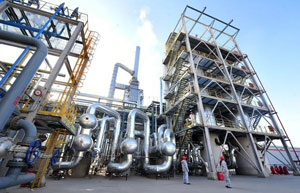US export policy change said to 'help both sides'
By Jiang Xueqing (China Daily) Updated: 2014-06-03 07:12Fast-rising production of natural gas and crude oil in the United States is prompting talk of changing the country's policy on oil and gas exports. Some bankers who specialize in energy finance contend that easing controls on exports of liquefied natural gas from the US to China will be economically and environmentally beneficial to both countries.
"Expedited approvals from agencies such as the Department of Energy and the Federal Energy Regulatory Commission will benefit LNG exports from the US to China, which is not on the list of free trade agreement countries. This is because LNG exports to countries on the non-FTA list require greater due diligence and approval processes as compared with those on the FTA list," said Paul Clifford, head of project finance in the Americas for Standard Chartered Plc.
Regulations permit LNG exports only to countries that have an FTA with the US. Shipments to other countries face a more complicated process involving a positive determination that the proposed exports would be "consistent with the public interest" of the US.
The "public interest" test encompasses a range of factors, including the impact on natural gas prices, domestic gas supplies and demand, environmental considerations and national security.
In the past three to five years, on the back of significant shale oil and shale gas discoveries, the export role of the US has changed dramatically.
US oil production increased 15 percent in 2013. And according to the Paris-based International Energy Agency, the US will become the world's largest oil producer in 2020.
"There have been some shifts and changes in terms of the way that the US looks at its energy," said Clifford. "We recognize the trend and the strategic importance that the US could play as a new and important source of gas exports."
As of March 24, the administration of US President Barack Obama had conditionally approved seven LNG projects since May 2011, with a daily total of 9.27 billion cubic feet of export capacity, for exports to non-FTA countries such as Japan and India.
Top Obama administration officials are also considering relaxing bans on crude oil exports that were enacted in the wake of the 1970s oil crisis.
US Secretary of Energy Ernest Moniz has said that "the issue of crude oil exports is under consideration" because some of the fast-growing supply of domestically produced oil is unsuitable for refining locally.
About 10 years ago, US refineries invested tens of billions of dollars to upgrade their processing capacity of heavy crude oil. But now there's an increasing mismatch between what their facilities can refine and the production growth of shale oil, which is light oil.
"A lot of people realized that it does make sense to allow light crude to be exported for the US to continue to process heavy crude and help increase the volume of supply globally ... There's a realistic chance that would happen," Clifford said.
|
 |
 |
- Asia's largest ICT show kicks off in Taipei
- Top 10 most expensive properties in Beijing
- New star emerging in global media market
- Kazakh students say Silk Road will create more jobs
- Shanghai drugstores begin sales of baby formula
- Economy on path of steady growth
- Foreign tech firms pose threat on Internet
- Banco do Brasil opens first China branch

















